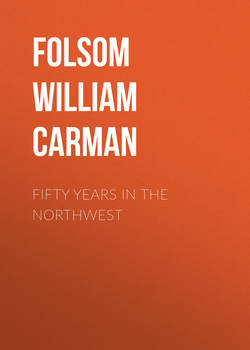Читать книгу Fifty Years In The Northwest - Folsom William Henry Carman - Страница 25
CHAPTER IV.
POLK COUNTY – DESCRIPTION AND HISTORY
THE LIQUOR TRAFFIC
ОглавлениеUndoubtedly the greatest curse to the pioneers of a new settlement, and to the aborigines as well, is the liquor traffic. The Indians, under the influence of whisky, became infuriated and were capable of committing any atrocity; the effects upon the whites were not so violent but just as surely demoralizing, and in time as fatal. Among dealers in the vile fluid there was no one more persistent and unscrupulous than Capt. M. M. Samuels. During the summers of 1848 and 1849 there was no other whisky selling house at the Falls. The character of the whisky sold was vile beyond description. Mrs. H – and son informed me that they were employed by Samuels during the summer in compounding various roots with tobacco and boiling them, for the manufacture of a strong drink that was sold for whisky. Many, both whites and Indians, were poisoned by this compound. As an emphatic evidence against the vileness of the liquor, I append some of the blighting results:
A talented young lawyer, Hall by name, from Philadelphia, became infatuated with the peculiar whisky furnished by Samuels, and when insane from its effects ran from Barlow's boarding house to a high rock overhanging the St. Croix river, just below the falls, plunged in and was drowned.
Another, named Douglas, under the same influence, tried repeatedly to drown himself, when his friends bound him securely with cords. He then managed to stab himself.
Alexander Livingston, a man who in youth had had excellent advantages, became himself a dealer in whisky, at the mouth of Wolf creek, in a drunken melee in his own store was shot and killed by Robido, a half-breed. Robido was arrested but managed to escape justice.
Livingston, once, when on his way from Wolf creek to Clam falls, sought refuge in my camp, having with him two kegs of whisky. The Indians soon collected at the camp in fighting trim and sung and danced madly about the door of the cabin, and clamored for scoot-a-wa-bo (whisky). I refused to allow any whisky to be issued. The Indians were furious. Livingston cowered with fear. Foreseeing trouble I ordered Nat Tibbetts and Jonathan Brawn to take the kegs and follow me. The Indians stopped their gymnastic performances and gazed intently. With an axe and with a single blow on each keg I knocked in the heads, and the whisky was soon swallowed up in the snow. The Indians sprang forward with demoniac yells and commenced licking up the saturated snow, after which they danced around me, calling me "Oge-ma" (captain). I gave them food and they went away sober and apparently satisfied.
